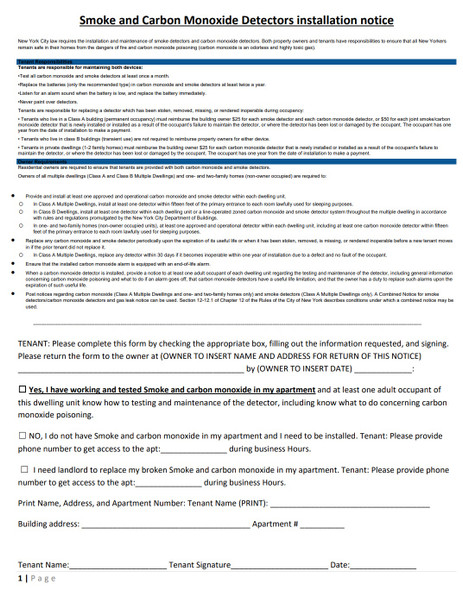hpdsigns.nyc
Smoke and Carbon Monoxide Alarms in Apartments and Homes (pdf file)
- SKU:
- FDNY smoke and carbon monoxide alarm
- UPC:
- MPN:
- FDNY smoke and carbon monoxide alarm
Description
The Importance of Smoke and Carbon Monoxide Alarms in Apartments and Homes
The New York City Fire Department (FDNY) emphasizes the critical importance of smoke and carbon monoxide alarms in safeguarding the lives of residents in both apartments and homes. These devices are essential components of a comprehensive home safety plan, capable of detecting fires and harmful gas leaks early, thus providing precious time for occupants to evacuate safely and for emergency responders to arrive.
Smoke Alarms: A Line of Defense Against Fires
Early Detection Saves Lives
Smoke alarms are designed to detect the presence of smoke, a common indicator of fire. Early detection is crucial as it allows residents to evacuate before the fire spreads and becomes more dangerous. According to the National Fire Protection Association (NFPA), three out of five home fire deaths occur in homes without working smoke alarms, underscoring the life-saving potential of these devices.
Types of Smoke Alarms
-
Ionization Smoke Alarms: These are more responsive to flaming fires. They contain a small amount of radioactive material between two electrically charged plates, which ionizes the air and causes a current to flow. When smoke enters the chamber, it disrupts the flow of ions, reducing the current and triggering the alarm.
-
Photoelectric Smoke Alarms: These are more responsive to smoldering fires. They use a light beam that, when disrupted by smoke, triggers the alarm.
Placement and Maintenance
For optimal protection, the FDNY recommends installing smoke alarms in every bedroom, outside each sleeping area, and on every level of the home, including the basement. They should be tested monthly, and batteries should be replaced at least once a year. Alarms that are ten years old or more should be replaced to ensure reliability.
Carbon Monoxide Alarms: Protecting Against the Invisible Killer
Understanding Carbon Monoxide
Carbon monoxide (CO) is a colorless, odorless gas that can be fatal when inhaled in high concentrations. It is produced by the incomplete combustion of fossil fuels in appliances such as furnaces, water heaters, and stoves. Since it is undetectable without a proper alarm, it is often referred to as the "silent killer."
Function and Importance
Carbon monoxide alarms are designed to detect the presence of CO in the air. When dangerous levels are detected, the alarm sounds, alerting residents to the danger. The Centers for Disease Control and Prevention (CDC) reports that more than 400 Americans die from unintentional CO poisoning each year, highlighting the necessity of these alarms in preventing fatalities.
Placement and Maintenance
The FDNY advises installing CO alarms outside each sleeping area and on every level of the home. Like smoke alarms, CO alarms should be tested monthly, and batteries should be replaced annually. Alarms should be replaced according to the manufacturer’s recommendations, typically every five to seven years.
Combined Smoke and Carbon Monoxide Alarms
Convenience and Comprehensive Protection
Many manufacturers offer combination smoke and CO alarms, providing a convenient, dual-function solution for home safety. These devices simplify maintenance and ensure both smoke and CO detection capabilities are present in all recommended areas.
FDNY Initiatives and Regulations
Local Laws and Compliance
New York City local laws require the installation of smoke and CO alarms in all residential buildings. Property owners are responsible for installing and maintaining these devices in rental properties, and tenants must ensure they are operational. The FDNY conducts outreach and education programs to raise awareness about the importance of these alarms and to assist residents in complying with local laws.
Public Education and Outreach
The FDNY’s Fire Safety Education Unit offers resources, workshops, and programs to educate the public about fire and CO safety. These initiatives aim to empower residents with the knowledge and tools necessary to protect themselves and their families.
Conclusion
Smoke and carbon monoxide alarms are indispensable in protecting lives and property. By providing early warnings, these devices enable timely evacuations and prompt responses, significantly reducing the risks associated with fires and CO poisoning. The FDNY’s ongoing efforts to promote the installation and maintenance of these alarms reflect their commitment to ensuring the safety and well-being of all New York City residents. Investing in these alarms is a small but vital step toward creating a safer living environment.
DISCLAIMER These codes may not be the most recent version. The State / federal or other regulation department may have more current or accurate information. We make no warranties or guarantees about the accuracy, completeness, or adequacy of the information contained on this site or the information linked to on the state site. Please check official sources.
DISCLAIMER these codes may not be the most recent version. The State / federal or other regulation department may have more current or accurate information. We make no warranties or guarantees about the accuracy, completeness, or adequacy of the information contained on this site or the information linked to on the state site. Please check official sources. The requirements for detector are determined by intended use and by applicable regulation. The BUYER is responsible for determining the appropriate detector needed. WE make no warranty or representation of suitability of a detector to any code or for any specific application. IT IS THE CUSTOMER'S RESPONSIBILITY TO ENSURE THAT THE DETECTORS THE CUSTOMER ORDERS ARE IN COMPLIANCE WITH ALL STATE, FEDERAL, LOCAL, AND MUNICIPAL LAWS. Please review terms and conditions prior to purchase. For more information about what is required, see the laws that are referenced and the rules applicable to your city and state. This page is for informational purposes only and is not intended as legal advice, professional advice or a statement of law. You may wish to consult with an attorney.
Related Products


SMOKE CARBON MONOXIDE ALARM (PDF)
hpdsigns.nyc


Smoke and Carbon monoxide detector installation notice (pdf file)
hpdsigns.nyc

Carbon Monoxide Detector Installation Notice -HMC § 27-2046.1 (pdf file)
hpdsigns.nyc







